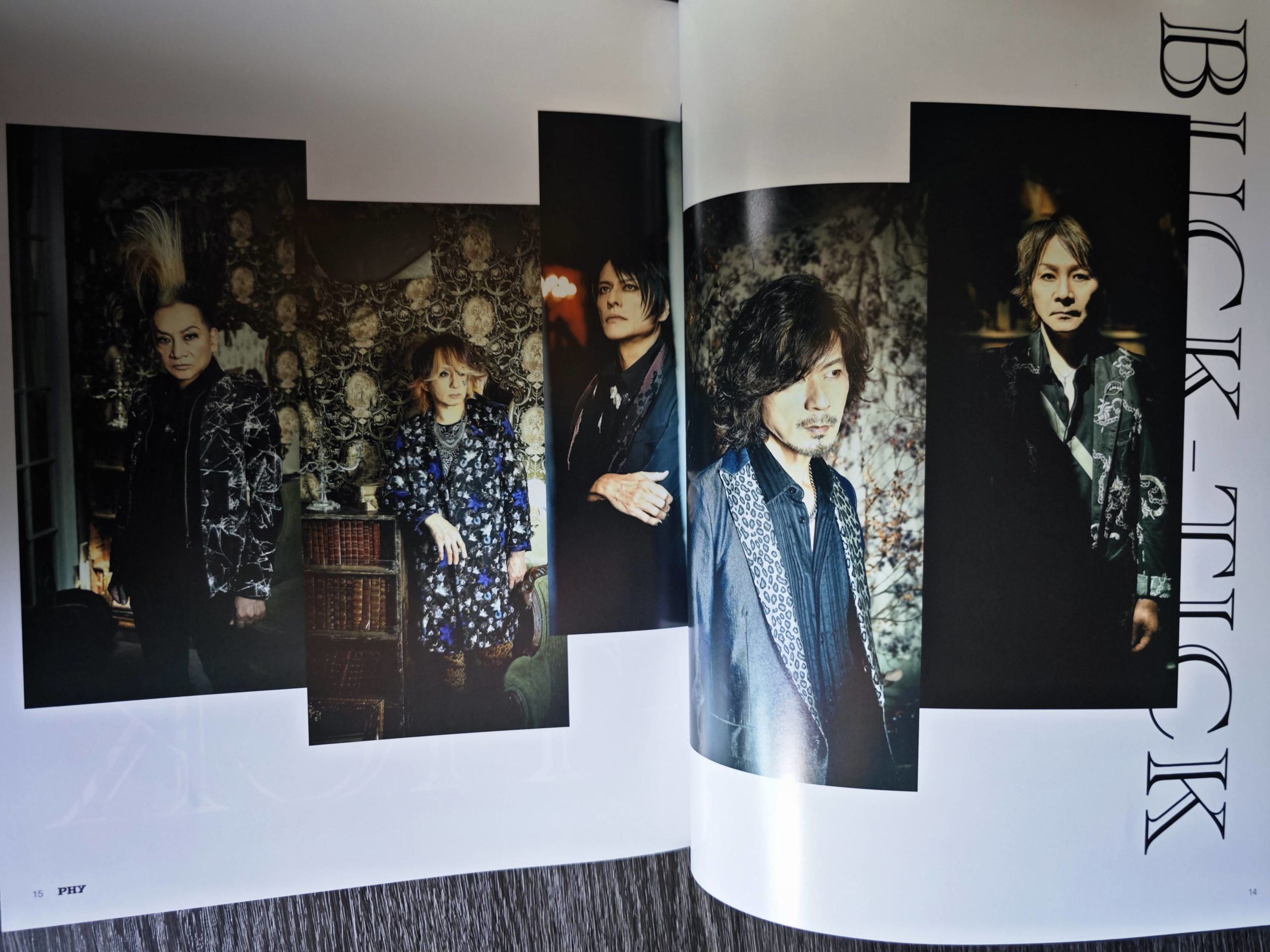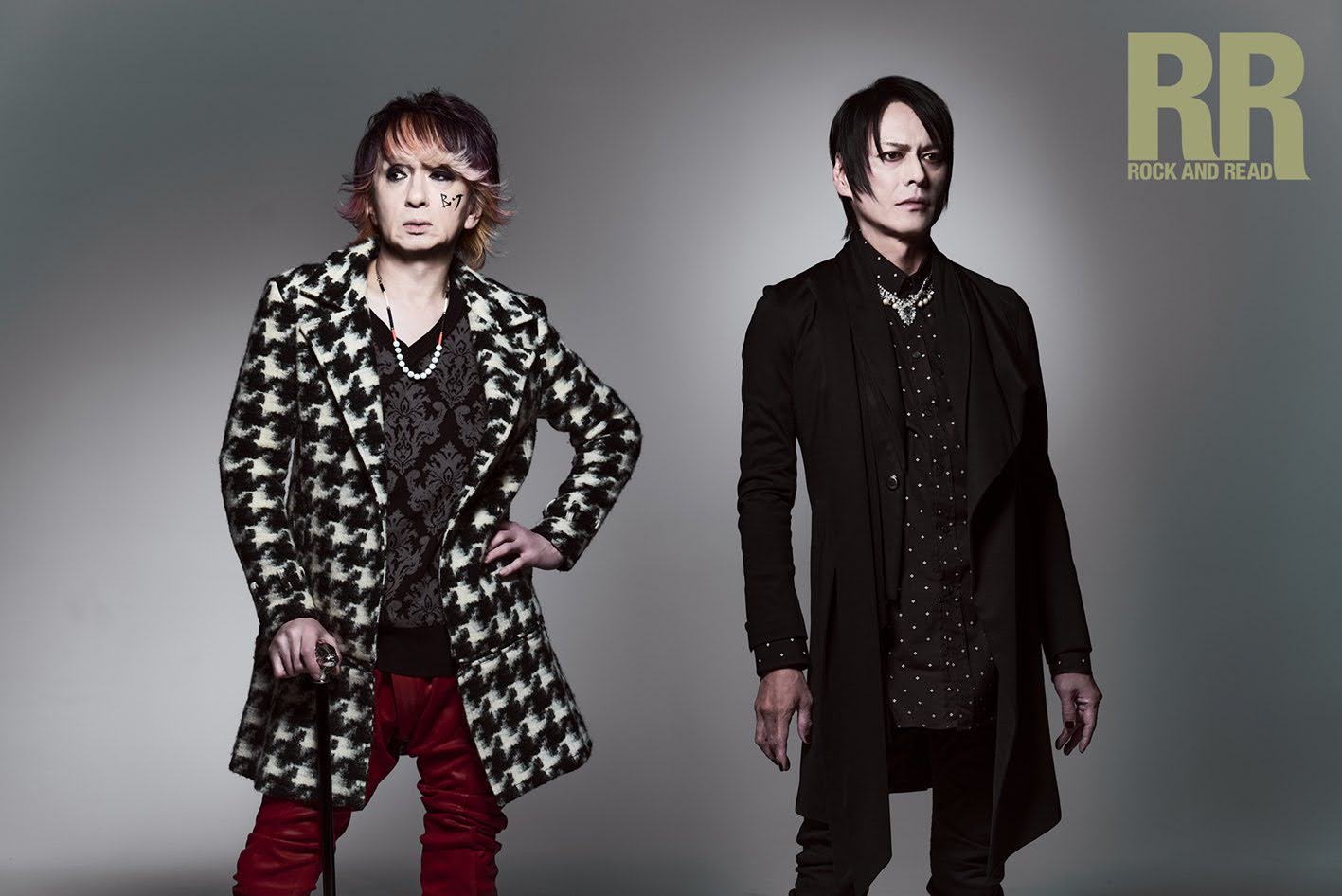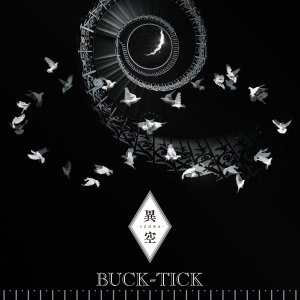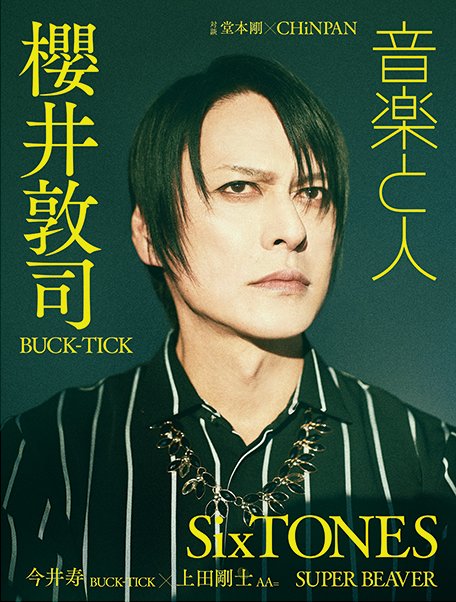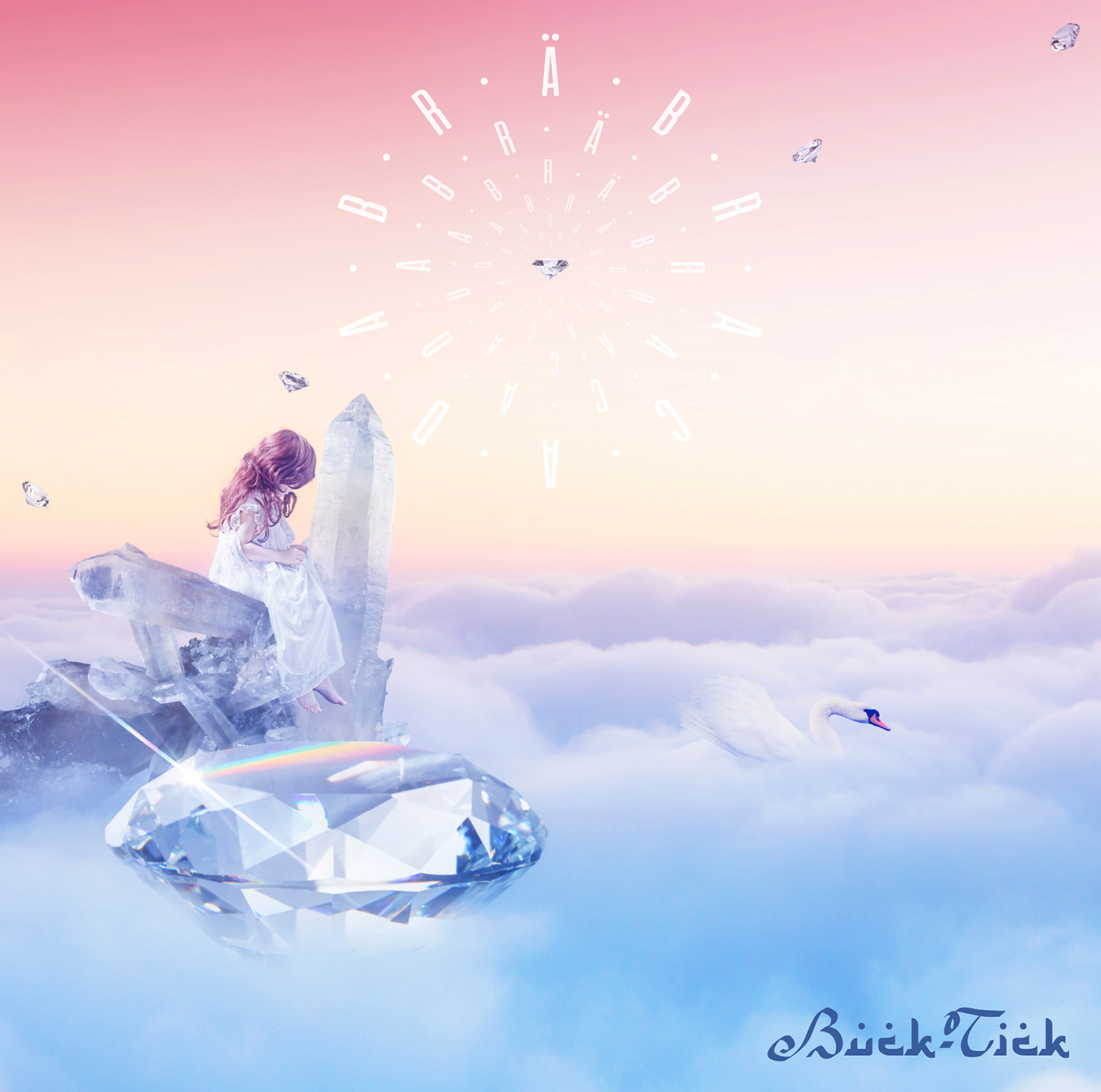
A new step towards personal transformation
Interview with Higuchi Yutaka
Bass Magazine Vol.359
May 2023
Interview: Nakamura Kengo
Photos: Seitaro Tanaka
Layout: D.tribe
Celebrating their 35th anniversary, BUCK-TICK is a band at the forefront of the rock scene. Throughout their long career, they constantly ingest a diversity of musical elements, digest and regurgitate them in unexpected manners, bringing their audience a new touch to their BUCK-TICK sound with each release.
The same could be said about their 23rd original album, 異空 -IZORA-. Their way of music is alive and well with how the songs go from indulgent rock, to riffs reminiscent of classic rock music, to an alluring jazzy medium, exhilarating beat tunes, to B-T’s style of city pop (?) and more. Bassist Higuchi Yutaka a.k.a. “U-ta” supports the band with a steady foundation revolving around “an approach which involves carefully picking the number of notes”. In this interview, we hear about Higuchi’s present mindset as he continues to look towards the innovation of his band’s sound.
PROFILE
Higuchi Yutaka ● Born on 24 January 1967, from Gunma Prefecture. Debuted with a major label as the bassist of BUCK-TICK in 1987. The band has since continued activities at the forefront of Japan’s rock scene with no changes in member line-up. They released 異空 -IZORA-, their 23rd original album on 12 April 2023 and are currently on travelling the country for their “BUCK-TICK TOUR 2023 異空 -IZORA-” until July.
◎https://buck-tick.com
When there’s a reduction in sound
it feels like [the bass] is “breathing”.
――When you celebrated your 35th anniversary last September, it started off with the release of a concept best-of album and the commemorative concert.
Yuta (Y): The 35th anniversary concerts we held at Yokohama Arena turned out to be shows that we could’ve only held in this era considering the combination of societal events surrounding us like COVID-19 and the Russian-Ukraine war. But after that, we made up for it in the following tour which ran through to the end of the year and we managed to make it a kind of “joyous tour”. In recent years, we haven’t been able to tour at all because of COVID-19 and just when we thought we could, Imai (Hisashi/guitarist)-kun broke his leg. Ultimately, we’re a band who started out in the indies scene and used to tour around the whole country driving on the highways, so this tour was super fulfilling for us and I’m happier than ever that we could visit the different cities.
――Your best-of album, CATALOGUE THE BEST 35th anniv. was divided into five discs with their respective themes; “RIBELO”, “GOTIKA”, “ELEKTRIZO”, “FANTAZIO”, and “ESPERO”. That sounded like an interesting experiment.
Y: We’ve released best-of compilations before, so we came up with this format when we were thinking about possible presentations that could make things interesting, and we’ve got quite a number of songs because we’ve continued like this for so long, so ultimately, I felt this was an idea that that we could executed only because we’ve tried so many different things before. Besides, when BUCK-TICK was first formed, no one in the band had any sort of musicality. We’re basically just five friends from the same hometown who enjoy doing this together. We have Imai-kun and Hide (Hoshino Hidehiko/guitarist) as our two composers and both of them kept coming up with better and better music. And I think that as the music we make changes, they have been able to reflect that well in different ways. I think the fact that I have to cater to all kinds of music is training from the two composers (lol).
――How did you tackle the production of your latest album, 異空 -IZORA-?
Y: It’s the same every time we’re celebrating a significant anniversary year, but the “theme” was to make sure we don’t run out of steam during the anniversary year. We wanted to bring an atmosphere that we’ve never had before, or take a step towards something new that we wanted to do.
――The songs which were revealed ahead of the album’s release were Sayonara Shelter which was also recorded on the best-of album, and the two singles, Taiyou to Icarus (太陽とイカロス / The Sun and Icarus) and Mugen LOOP (無限 LOOP / Infinity LOOP). BUCK-TICK generally has a dark image, but all of these songs are cheery, or rather, they sound refreshing.
Y: That’s right. They weren’t made with the fixed notion that “This will be a single!” or anything like that, but I did get the feeling that these songs might be in the running to be released as singles in the middle of producing them. Although, we didn’t deliberately aim to make cheerful songs, it just happened to turn out like this. Whether Taiyou to Icarus or Mugen LOOP, they are songs that bring out a sense of pop that we’ve never really done before, so I guess there’s a possibility that a part of them shows we’re doing something different yet again.
――Do you as a bassist consciously try to incorporate new approaches?
Y: No, ultimately, the priority is “to play the bass in a way that suits the song”. Based on that, I tried employing the use of an upright bass in the songs Noraneko Blue (野良猫ブルー / Stray Cat Blue) and Hizumi (ヒズミ). I rarely ever use an upright bass in recording work. I would generally use a regular bass for the studio recording and then play that live with an upright bass. So this time, I just thought maybe I should try using an upright from the very beginning.
――The extended greasy feeling of Noraneko Blue’s intro was something I thought could have only come from playing the longer strings of an upright bass. Does the phrasing change for you when you play with an upright instead of simply using a fretless bass?
Y: It does. Also, I took the opportunity to record using a mic instead and the sound definitely had a more human touch to it. It completely changes the vibe too. In terms of sound, what an actual wood bass produces wins hands down, but it’s interesting how [doing this] creates a slightly different feel. I can’t think of a better way to say this, but there’s this vague sense of going off-tune, like the pitch sounding ambiguous which makes it interesting.
――Instead of overusing the unique approach that the upright bass calls for, you only applied it at certain points, like part of the interlude and the chorus. While in the rest of the song, you went with keeping things sounding tight. I think the added seasoning this contrast brings is just exquisite.
Y: When it comes to the bass, I keep in mind the feeling that I’m also part of the chorus singing, in the sense that it would be good if I can really feel the rhythm of the melody and get into it. I think making music with this awareness would naturally lead me towards playing my bass in that manner you speak of.
――Hizumi develops with the same rhythm pattern, but I think there’s an added intentional nuance in there with the way you added a bit of grease only on the fourth beat of the last bar of the bassline in the A melody. It’s as if you applied a technique which lets listeners feel something instead of adding filler phrases.
Y: That’s probably another result of me wanting to bring feelings into my bass and match the vocals. In such a situation, I notice that compared to before, there’s more work done to reduce the sound of the bass these days. I feel like doing that brings out emotion, or makes it feel like it is “breathing”.
Making the bass sound like it’s waving it’s arms, trying to get noticed is just so uncool (lol).
――The first track on the album, QUANTUM Ⅰ is an instrumental and it’s got a heavy synth bass in it. Following that, in the second track, SCARECROW, after the vocal and guitar arpeggio, the bass comes in alongside the synth bass and it was so strong that it surprised me.
Y: That might also be related to the fact that I used a 5-string for this song. I didn’t originally intend to use the 5-string, but simply put, this song is a “weighty” one, so I thought maybe it’s a good idea for me to pile on the “weight” (lol). I hope it was a good choice made.
――The A melody in SCARECROW progresses with long tones, but there that greasy feeling comes in during chord changes which boldly brings out the sense that this is being played by an actual bass. I would think that how much of that you put in is one of those factors that would make subtle changes to the groove, but were you still thinking about how to mesh this together with the main melody?
Y: That’s right. Also, if there’s too much grease in there it’d be like the bass is going, “Heeeey! Hello!! I’m here!” Waving its arms around, being so uncool (lol).
――Like you’re trying too hard to get noticed (lol).
Y: Yeah, and that’s something I definitely don’t want. So while there are parts where the greasing comes in and where it drops for a transition, there are also times when the main melody would stand out more, or the guitar would sound more appealing if just one more note of transition gets included.
――In terms of sound, is the slightly distorted vibe we get from the songs, including SCARECROW, something that is always there?
Y: That’s right. There’s basically always some sort of distortion. As to exactly how distorted, that’s something we decide on with the tech people, but our band does a lot of loops too, so to make it obvious [to listeners] the bass is also distorted, we have to make it sound incredibly distorted. Otherwise it wouldn’t sound like it is at all. That’s why I often get told that “this sounds normal” even when something is in fact distorted (lol).
――How do you do it?
Y: It depends on the situation. Even if I bring in the distortion using an amp, there’s a variety of equipment we use like the ampeg and so on. And even after distortion using the amp, tech and the engineers would do all sorts of effects processing on the sound too. In live concerts, I use Music Man amps and the effector I use is either SOURCE AUDIO or one of the tones from ZOOM’s MS-60B.
――Boogie Woogie has a rather distorted sound but it reminds me of Unison Riff and the guitars sound like that of 70s rock music.
Y: I remember applying quite a lot of distortion to it. If I didn’t, the bass would wind up in a mess. If only the guitars were distorted, then the bass alone would feel like it’s lagging behind when it all comes together. There wouldn’t be that feeling of speed. And that’s why I distorted it. Even the texture of the distortion was made to resemble something from the past. I know that songs like this one aren’t like most of what BUCK-TICK has done before, so I’m looking forward to playing this live.
――THE FALLING DOWN is also coarsely distorted. For certain songs, I’d assume you have to hold your bass a little higher up your waist and play it kind of punk-style, right?
Y: The moment I heard this song, I already got this feeling of being hit by a ball that was thrown at my head. That’s why I just went ahead and played it without thinking too much. When I heard the song, I also thought that if we were to distort things, then it might be interesting to do something that sounds like The Stranglers too.
――What equipment did you use in recording?
Y: I used fretless bass guitars from Greco, and a Rickenbacker. There were two fretless basses; usage was split between an old bass and a new one. Because I feel like it would be better to use the new one if I’m playing an energetic song. I’ve used the Rickenbacker for a long time now. It was even used in Speed on the album Kurutta Taiyou (1991). The sound it makes is pretty coarse, so I guess you could say that the distortion would come with it more than you’d expect. The upright bass I use is made by Landscape.
――What about the 5-string in SCARECROW?
Y: It’s something Greco produced for me in the past. Since it was made way back, you can guess that it’s really heavy. As heavy as two basses (lol). I asked them to make me one more to use as a substitute just in case, and it was about a third of the weight. I was thinking, “Is the difference really that big?!” (lol).
I find myself enjoying playing with a pick recently.
一一Earlier, you said that you’re removing notes more often in your bass play now, and I got the feeling that there was some deliberate decisions made in Na mo Naki Watashi (名も無きわたし / I, Nameless) for which parts had notes and which didn’t. It would’ve been okay for you to just bury the bass with the 8-beat route in the B melody, but you instead went with patterns like one rest at the start of the third beat, and having more notes in the second A melody than the first yet at the same time less than the number of notes in the B melody, so on and so forth.
Y: Precisely. Because this is a song where I think it’s better for me to play as little as possible. That’s already decided right from the very start. I actually thought it would’ve been enough if I just did the “doon, da-da…” through to the end, but it would ultimately just make things monotonous.
――Is there any reason why you started to play with the conscious intention to reduce the number of notes?
Y: I suppose it might’ve started from my desire to prioritise the melody. Back when we just started playing as a band, it was thought that there was no question that the bassist stood on the side of the drummer as the rhythm team, but the bass has now moved a little more towards the melody side of things so I thought maybe I could just do one note at the start of each bar and not play the rest of it? (lol) Or it could be that we started to have more songs that place emphasis on the melody, more slow tempo songs. I think the way I feel the music changed with those types of songs.
――At the start, we spoke about the bass in Mugen LOOP too, but I think its light rhythm pattern with its note values and sound breaks actually add to how pop the song sounds on the whole.
Y: One thing I was concerned about with this song was how it would immediately end up with a stylish ambience if I get even one thing wrong. Because the BUCK-TICK-ness would get diluted if the song tends towards that direction. It would turn into something that probably makes you think, “This might possibly be BUCK-TICK, but something’s off?” (lol). I think we did a good job executing that kind of subtlety.
――While the cheerful sounding Campanella Hanataba wo Kimi ni (Campanella 花束を君に / Bouquet For You) has a bit of motown vibes in it. Is motown also a genre that Yuta-san enjoys?
Y: That’s right. But this song was the most difficult one for me. When I was working on it, I kind of felt like I couldn’t hit it quite right. I think it was the way I felt the bouncy rhythm, but since it’s something I liked, I gave the old motown songs and other similar types a proper listen and got the feeling that perhaps that may just be the exact problem. Like, “For some reason, I just can’t play like how they sound back in the day.” I think I managed to get the bass in a good spot, but I think I still need to study more (lol).
――In recent years, Yuta-san often plays with finger picking but you used a pick for Taiyou to Icarus?
Y: That’s right. In this album, I used the pick in both Boogie Woogie and THE FALLING DOWN too. Actually, I guess I find myself enjoying playing with a pick recently. I realised I could do quite a surprising variety of things [using a pick], including creating the sense of speed and some other sound production related things. Also, I’ve begun to find play styles like that of The Ventures and Kabe Masayoshi-san’s intriguing. I can’t do it anywhere as well as them, though (lol).
――You’ll soon embark on your album tour. How do you think it’ll turn out?
Y: I mentioned this at the start too, but as we celebrate our 35th anniversary, we don’t know how much further we can go but we’ve made an album that signifies a new first step for us, and since we’ve been in a state that prohibits cheers and has all kinds of restrictions on concerts in recent years, I feel like [this tour] will also be our first step [out of] that situation. By producing an album and then going on tour, we can let our audience experience the songs through an interpretation they may not have had, and depending on how things turn out, there’s also the possibility to turn the songs into masterpieces, so I’m looking forward to that as well as meeting all those who have been waiting for us.







